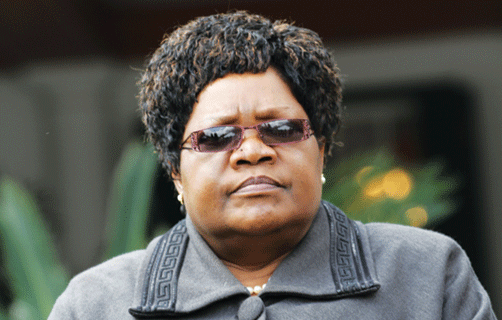
ZAPU leader Dumiso Dabengwa has described the recent ouster of former Vice-President Joice Mujuru as “a brazen display of basic disrespect for basic rights and processes” and labelled her detractors as “malevolent evil geniuses”. SILAS NKALA STAFF REPORTER In a speech to mark Unity Day today, the former Zipra intelligence supremo said those purged alongside Mujuru were plotting a comeback, setting the stage for an intricate political fight in the ruling party.

“The orchestration of this power grab was skilfully managed by evil geniuses to focus on a vicious and malevolent denigration of the sitting Vice-President Mujuru,” Dabengwa said. Dabengwa said Mujuru had been savaged at the Zanu PF congress and this was ominous for democracy in the future.
“Zanu PF, at its just-ended congress savaged the country and party’s Vice-President Joice Mujuru and her presumed allies and supporters,” he said.
“The important point here is not any interest in the party’s internal preferences, but the brazen display of disrespect for basic rights and processes.”
Dabengwa said some sacked members were not going to take their fate lying down and were plotting a comeback.
“We have not sought their collective views, but we have it on reliable authority that people like Rugare Gumbo, Ambrose Mutinhiri and Ray Kaukonde are not going to take their fate lying down,” he said.
“Our unequivocal position is to urge them to stick to principle and to fight for democratic space so that events like Unity Day have meaning for all Zimbabweans within the country and in their respective political formations.”

A war of words is simmering between Dabengwa and Zanu PF after newly-appointed Vice-President Phelekezela Mphoko suggested the Zapu leader had wasted time by breaking away from Zanu PF.
- Chamisa under fire over US$120K donation
- Mavhunga puts DeMbare into Chibuku quarterfinals
- Pension funds bet on Cabora Bassa oilfields
- Councils defy govt fire tender directive
Keep Reading
Dabengwa hit back, advising Mphoko to shut up about his liberation war credentials, triggering massive attacks on the Zapu leader from the State media.
The war of words is not showing any signs of letting up as Dabengwa described those who led the ouster of Mujuru and her perceived allies as “malevolent evil geniuses”.
Dabengwa said they were in engagement with some former Zanla cadrés who had a longer view of where the country came from and what the liberation agenda was.
“It is early days yet, but the thrust of this engagement is to explore how the broad aims of our struggle for freedom and people-centred government can be restored to be the point of departure instead of the shell of presumed family-centric glory,” he said.
Dabengwa said it was shocking that three decades after independence the ruling party’s congress departed from being elective to becoming appointive, meaning that the already “guided democracy” that was in place for the choosing of the vice-presidents was now unequivocally vested in the hands of one person.
“The upheaval inside Zanu PF has repercussions that are beginning to take shape, the most important of which is increased hero-worship and signs of the evolution of a dynastic Gushungo clan leadership,” he said.
“If that development was limited to the ruling party, it would be of no interest to most of us.
“However, the visible and invisible hand of the First Lady in the making and unmaking of government leadership is something that needs to be decried.
“It is something that can erode whatever is left of collective leadership after a relentless trend of centralisation, this time with the added disaster of an untried and untested family-based leadership.”
Dabengwa castigated First Lady Grace Mugabe, credited with Mujuru’s ouster, for being insensitive to the people of Matabeleland after she said people of the region preferred going to neighbouring countries for trinkets.
“This insensitivity at the centre of power is not just a slip of the tongue, it merely underlines how necessary a devolved system of government is, instead of centralised power that blames the marginalised for their situation,” he said.
Dabengwa said that is why, as the country approaches 2015, all progressive forces had to insist on the full implementation of the provisions for devolution of power that are enshrined in the new Constitution.










